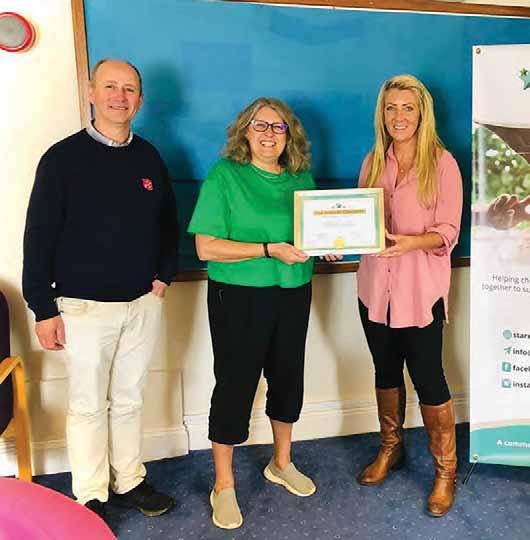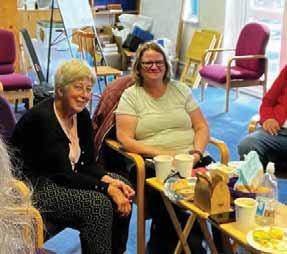
6 minute read
Territorial structure update
Change when it’s needed
Lieut-Colonel Dean Pallant presents the July update on the work of the Structure Co-ordination and Design Group
THE Structure Co-ordination and Design Group (SCDG) has been developing an initial implementation plan while waiting to hear how International Headquarters and the SATCo Board respond to the ‘direction of travel’ that was approved by the Cabinet earlier this month. We will continue to update you, but we are now into the summer months and understandably the pace will slow while people take well-deserved holidays.
One section of the report to IHQ and SATCo focused on the important question: ‘Why is change needed now?’
The biggest ‘why’ we do what we do is because we are part of God’s mission to the world. Our longing is for people, communities and nations to flourish and we do this through our mission priorities: sharing the good news of Jesus; serving without discrimination; making disciples of Jesus, caring for creation; and seeking justice and reconciliation. That’s the mission we want to deliver even more effectively across our territory, and the SCDG has been exploring, with your input, how we can better achieve this goal.
IS CHANGE REALLY NEEDED RIGHT NOW?
Yes! It’s important we act now because:
1We must prioritise local mission flourishing. This is God’s mission and we know our loving Heavenly Father wants people and communities and The Salvation Army to flourish.
2We need to help people flourish and we do this by focusing on our five mission priorities (see left).
3The people delivering The Salvation Army’s mission have told us they find many of our current processes and structures a burden. We must integrate and streamline the way we work.
4Our costs for support and oversight must be kept realistic, prudent and effective so we can spend/ release more money on local mission delivery. We must ensure that we have the data to prove that donations from the general public, as well as our loyal members, are always being used effectively.
WHAT WILL CHANGE LOOK LIKE?
We will prioritise local mission
flourishing. Salvation Army people need systems that help them do their work. There have been concerns for years that the administrative burden placed on corps is too great – which was also confirmed during the Listening Phase of the project. People want to be released from this burden and focus on their local mission and for any support and oversight to help not hinder mission.
Our Army must help people flourish.
Change is a constant in life. However, the speed of change in the past decade has been remarkable. These days, large corporations are only business planning for the next 400 days because three to five-year plans can quickly become out of date. This context impacts our own work. We need processes, structures and an organisational culture that are adaptable, organic and flexible – without losing our mission focus to love God and love others. Therefore, we need to streamline and integrate our processes.
We will empower people for mission.
After a turbulent few years, many people are tired in our communities and in our territory. Some corps life is fragile as we emerge from the Covid-19 pandemic. Integration is one of the desired outcomes for this work, and what better time to strengthen The Salvation Army by increasing interaction, integration and collaboration between all expressions of our mission within a geographical region to improve our support of each other in the work?
We must be good stewards of our people and financial resources.
While finances haven’t been the driver for organisational change, we must, of course, be good stewards of the resources we have been entrusted with. Mission and people have come first because we know that God will meet our ‘needs according to the riches of his glory in Christ Jesus’ (Philippians 4:19). We do not approach this task with a mentality of scarcity but with the promise of abundance.
The greatest risk for the future of this territory is a lack of covenanted disciples of Jesus who are called to serve through The Salvation Army – whether that is through officership, soldiership, adherency or local officership. Therefore, ensuring that we have processes and structures that help people serve God through The Salvation Army now is critically important. Equally, we must make sure that our people are well cared for. Previous organisational changes have been extremely painful for many dedicated, faithful Salvation Army people.
HOW CAN I BE INVOLVED?
While much of the preparatory work has now been completed by our Divisional Design Groups and Service Design Groups, you can still tell the SCDG about how mission is flourishing where you are. The SCDG continues to be grateful to those who have contacted us by emailing transformation@ salvationarmy.org.uk. We read and respond to every message.
Please do continue to pray for the project as it begins to move into the implementation stage. Thank you for your prayers and continuing patience as we work through this process.
LIEUT-COLONEL DEAN PALLANT
Secretary for Communications THQ
A journey of hope
Jo Noble-Gresty shares how Winton Corps is walking alongside those in recovery
WHEN you think of addiction, what comes to mind? Maybe alcohol, nicotine, recreational drugs or gambling. Add pornography, sex, prescription drugs, caffeine, gaming, social media, mobile phones, shopping, compulsive behaviours, over-eating, under-eating, self-harm, exercise and work and you can see the size of the problem affecting society.
Contrary to public opinion, addiction is not a choice. It’s a chronic illness accompanied by struggle, shame, stigma and stereotyping. Biological, behavioural, environmental and psychological factors contribute to its complicated nature. Emotional pain from trauma, regret and isolation compound the problem. The result alters the structure of the brain and – whether it’s substance misuse, compulsive behaviour or secret habits – the bottom line is the destructiveness addiction brings, which has a negative impact on physical health, mental health and relationships.
For every person struggling with addiction, 10 people are affected. That makes it a community problem and one that can’t be ignored.
While Bournemouth is no different to many other places across the country when it comes to addiction, it does have a highly active recovery ministry shared across its churches. In the past eight years, more than 1,000 people have attended church-based recovery courses.
The recovery ministry journey at the corps began in the summer of 2019, at an information session on the Recovery Course – a well-established programme based on the 12 steps of Alcoholics Anonymous that incorporates Christian principles. There we identified that we could be part of the churches working together across the area to support those affected by addiction to help them find freedom. It was a challenge that we felt God was leading us to accept.
We offered to host the Recovery Course in January 2020, and an invitation from the platform during Sunday worship in September 2019 attracted 22 people who were keen to become involved. A further eight people with lived experience of addiction joined us from other churches to create an enthusiastic team willing to share their gifts to welcome, inform, support, cater for and pray for our guests. A series of information and training sessions followed, and we were able to witness first-hand how the course worked, which was invaluable.
When January 2020 came we were pleased to welcome guests to the course. These people became our friends as we learnt something of their stories. We were blessed and encouraged to hear from our group leaders and guests the most amazing testimonies of journeys from addiction to freedom. They shared how God had brought about that transformation.
But then the Covid-19 pandemic hit in March 2020 and put a stop to our in-person meetings.
The isolation that came with that, and its effect on people in recovery, was immense. Their access to much-needed support groups suddenly stopped.
In July 2020, we could meet outside in groups of six, and so started a weekly Recovery Coffee and Conversation












